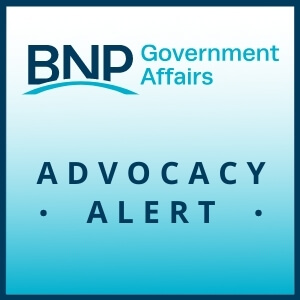7.28.22 Advocacy Alert: Congress Moving on Chips, Climate, Healthcare
After months of quiet negotiations and apparent gridlock, two major legislative updates came out of our nation’s Capitol last night. The U.S. Senate passed a landmark technology and innovation investment bill, and a key Senator announced support for a larger domestic spending package.
Senate Passes Chips Plus
Yesterday, the U.S. Senate passed a major semiconductor funding bill in a 64-33 vote. This bipartisan achievement is the culmination of a year’s worth of negotiations.
The legislation is aimed at expanding domestic production of semiconductor chips – essential components of many computer-based devices. American semiconductor production has fallen, and the U.S. currently manufactures little of the most modern semiconductors. America’s reliance on foreign (particularly, Chinese) semiconductor manufacturing is a national security risk that may also be contributing to supply chain delays.
The BNP called on Congress to make such an investment in our 2022 Advocacy Agenda.
The “Chips Plus” legislation -- previously known as the Endless Frontier Act, the U.S. Innovation and Competition Act (USICA), and the COMPETES Act -- is designed to boost U.S. investment in innovation and technology, in part by constructing regional technology hubs across the country.
The Senate bill is smaller than previous versions, but includes $79 billion in new spending. Key investments include subsidies and tax credits for companies that produce semiconductors.
Critically for our region, the bill will create at least 20 regional technology hubs supported by strategic federal grants. Senator Schumer has vowed to use his influence to secure a hub in Buffalo Niagara, which would be transformational.
Manchin Announces Reconciliation Deal
Almost immediately following the passage of Chips Plus, Sen. Joe Manchin (D-WV) announced his support for Democrats’ reconciliation legislation. The announcement surprised Republican leaders, who were only willing to discuss Chips Plus if reconciliation appeared dead. Manchin, whose opposition to the “Build Back Better” reconciliation bill sealed its fate, agreed to a relatively less aggressive package.
The new reconciliation bill would spend $739 billion, financed by increasing the minimum corporate tax rate to 15%.
The bill would make numerous healthcare changes, including allowing Medicare to negotiate drug prices and capping out-of-pocket costs at $2,000. Democrats also claim the bill would lower ACA health insurance premiums.
The most significant investment in this bill is into Democrats’ climate priorities. Democrats claim the legislation will reduce carbon emissions 40% by 2030. The bill would allocate hundreds of billions for tax credits, subsidies, and rebates to incentivize:
- Residential solar, electric heating appliances, and heat pumps
- Electrification of home appliances
- Electric vehicles
- Manufacturing of solar panels and electric vehicles
- Clean energy generation
Notably, this bill’s approach differs from that of New York State. Instead of banning certain energy technologies and fuels, this bill would create incentives (via substantial federal investment) to promote low-emission energy.
However, the bill is not yet a done deal. No Republicans are expected to support the bill, so Democrats need all 50 Senators to support it, allowing VP Kamala Harris to break a tie. Manchin represents a 49th vote, but it is unclear whether Sen. Kyrsten Sinema (D-AZ), who opposed past reconciliation efforts, will support this version. Sen. Dick Durbin (D-IL) tested positive for COVID this morning, delaying a potential vote on this bill. The Senate Parliamentarian also needs to verify whether the bill’s contents justify the use of the reconciliation process. If the bill does clear the Senate, though, it is expected to pass the House and be signed by President Biden.
The deal came less than a day before the Commerce Department announced the “U.S. economy shrank for a second quarter in a row—a common definition of recession.”
The BNP will keep you updated as Congress debates the Chips Plus and reconciliation bills.
Related Posts
BNP Policy Focus: Natural Gas Ban
New York’s 2023 state budget includes a ban on fossil fuel equipment and building systems in new construction. The ban creates major concerns about energy affordability and reliability.
Advocacy Alert: State to Enact Final Budget
Governor Hochul and the State Legislature are finalizing this year’s state budget. Hochul and legislative leaders reached a deal that is expected to be passed late tonight.
In total, the budget will spend $229 billion – a record amount and a 33% increase in spending since 2019.
Advocacy Alert: State Budget to be Late
The State Senate and Assembly Majorities released their one-house budget proposals. Although the proposals are not yet law, they give a clear indication of how negotiations will go before the April 1 budget deadline.
Advocacy Alert: Legislature Plants Budget Flag
The State Senate and Assembly Majorities released their one-house budget proposals. Although the proposals are not yet law, they give a clear indication of how negotiations will go before the April 1 budget deadline.

